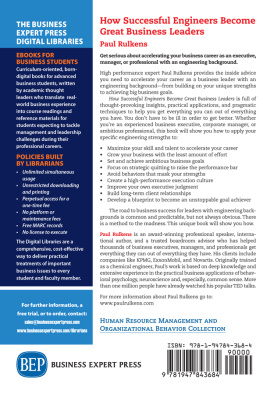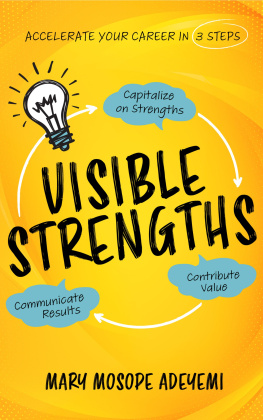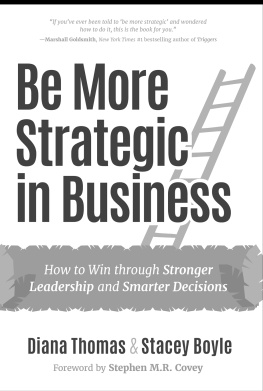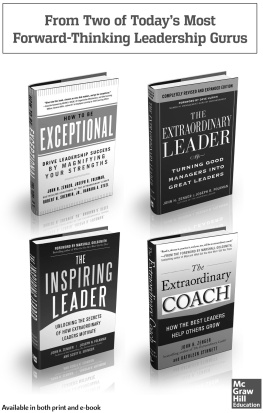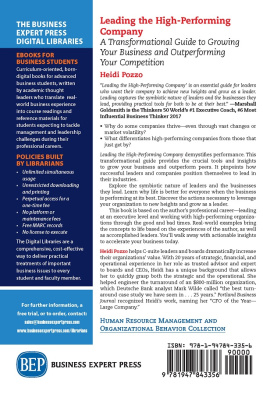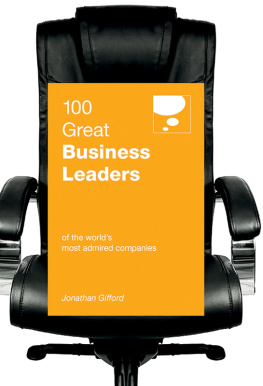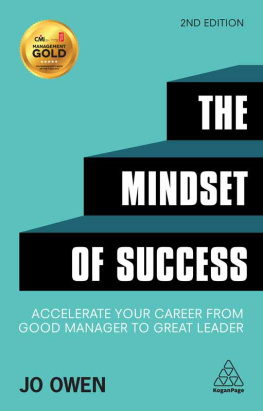How Successful Engineers Become Great Business Leaders
How Successful Engineers Become Great Business Leaders
Paul Rulkens

How Successful Engineers Become Great Business Leaders
Copyright Business Expert Press, LLC, 2018.
All rights reserved. No part of this publication may be reproduced, stored in a retrieval system, or transmitted in any form or by any meanselectronic, mechanical, photocopy, recording, or any other except for brief quotations, not to exceed 250 words, without the prior permission of the publisher.
First published in 2018 by
Business Expert Press, LLC
222 East 46th Street, New York, NY 10017
www.businessexpertpress.com
ISBN-13: 978-1-94784-368-4 (paperback)
ISBN-13: 978-1-94784-369-1 (e-book)
Business Expert Press Human Resource Management and Organizational Behavior Collection
Collection ISSN: 1946-5637 (print)
Collection ISSN: 1946-5645 (electronic)
Illustrations: Studio Dona
Photo author: Marc Schols
Cover and interior design by S4Carlisle Publishing Services Private Ltd., Chennai, India
First edition: 2018
10 9 8 7 6 5 4 3 2 1
Printed in the United States of America.
Abstract
High performance expert Paul Rulkens provides the inside advice you need to accelerate your career as a business leader with an engineering backgroundfrom building on your unique strengths to achieving big business goals.
How Successful Engineers Become Great Business Leaders is full of thought-provoking insights, practical applications, and pragmatic techniques to help you get everything you can out of everything you have. You dont have to be ill in order to get better. Whether youre an experienced business executive, corporate manager, or ambitious professional, this book will show you how to apply your specific engineering strengths to:
- Maximize your skill and talent to accelerate your career
- Grow your business with the least amount of effort
- Set and achieve ambitious business goals
- Focus on strategic quitting to raise the performance bar
- Avoid behaviors that mask your strengths
- Create a high-performance execution culture
- Improve your own executive judgment
- Build long-term client relationships
- Develop a blueprint to become an unstoppable goal achiever
The road to business success for leaders with engineering backgrounds is common and predictable, but not always obvious: There is a method to the madness. This unique book will show you how.
Keywords
business leadership, engineers, goals, high-performance organization, career, business growth, strategy execution
Contents
How does an engineer become a business leader? If I take myself as an example, my career path gave me a fascinating and broad experience. I have spent the first 10 years of my career in different manufacturing roles. This gave me the opportunity to apply my engineering training on a deep level. After that, I was offered an HR management development role at headquarters. It gave me a close insight in the roles and responsibilities of many other disciplines, such as marketing and sales and R&D. This really opened my world. My perspective was further expanded when I moved from Europe to Brazil and assumed full responsibility of the companys country operation. As a leader, I was suddenly involved in maintaining key contacts with governments, legal affairs, clients, etc. My work as a corporate executive has covered broad areas, such as risk-based auditing, safety, and leadership of worldwide operations. As the managing director of the NAP and DACE foundation, my current responsibility is to enhance the knowledge and network within the Dutch process industry chain in general on one side and the development of the profession of cost and value engineers on the other.
This brings me to a subject that is close to my heart: How can engineers accelerate their business careers? This is especially important, since the business field has changed for engineers. We operate within many more boundaries, for example, those set by standard work-processes, corporate rules, and law. Furthermore, business focus has shifted to shorter term results. This means less freedom for engineers who want to develop themselves. At the same time, individual engineers need to take much more personal responsibility for their career path and growth to business leadership. This requires a different mindset. Due to this changed environment, coaching by senior management is under pressure as well. And we can help them with that.
In the past, the path to career advancement was simply to become a more effective engineer, after which you get the opportunity to broaden your skills and experience. Nowadays, its no longer enough to climb the engineering ladder, but you need to become aware of which business ladder you are actually climbing. An engineering education, focused on the details of how to become a successful engineer, will not prepare you for this shift in thinking. Control is an essential part of the engineering training, yet the ambitious engineer needs to let go of control and step into the unknown to achieve business success. This requires climbing different ladders, trying different things with the confidence that your engineering skills and abilities will support you to be successful in other parts of a business as well.
I have known Paul Rulkens from my days as a senior operations executive with DSM. The first time we met, he helped my global manufacturing leadership team to set a new vision and especially think out of the box. Its therefore no surprise to me that he has written this book for leaders with an engineering background who want to continue to do things differently to accelerate their career. We share a common philosophy around leadership for engineers and thats why we founded Quantum Leap: a master program to accelerate the careers of high potential leaders with an engineering background.
How successful engineers become great business leaders provides a pragmatic approach to find a balance between optimizing your job and preparing for the next step in business leadership. This is recommended reading, not only for every leader with an engineering background who wants to boost his or her career, but also for senior managers that support these leaders as well.
Jan-Willem Sanders
cofounder Quantum Leap Master Program
My gratitude to Francesca Gambardella, Anneritte Rulkens, Riet Rulkens, Wim Rulkens, and Heidi Pozzo for their valuable comments and insights.
Thank you Alan Weiss for inspiring me to always think bigger.
I am very thankful to Jan-Willem Sanders: We share the same passion and excitement to help business leaders with an engineering background.
Thank you Paresh Bhakta, Marcel Berkhout, Stpan Breedveld, Jian, Aloys Krechting, Erik Oostwegel, Guus Pelzer, and Luca Rosetto for sharing your perspectives with me.
Deep appreciation goes to the wonderful BEP team: Charlene Kronstedt and Rob Zwettler.
My thanks to my editor Dorseda de Block, my graphic designer Marieke Dona, and my digital strategist Jan Scheele.
Why This Book
The brilliant yet borderline insane poet William Blake once wrote, Eternity is in love with the productions of time. I have always felt that the ability to design, create, and produce useful things that have enhanced the happiness of billions of people, now and far into the future, is a noble calling. Its the calling of an engineer. Interestingly enough, this calling often extends to engineers taking up the mantle of leadership as well. Since more than 30 percent of Fortune 500 CEOs have a degree in engineering, the field is clearly a stepping stone to business leadership at the highest level.

